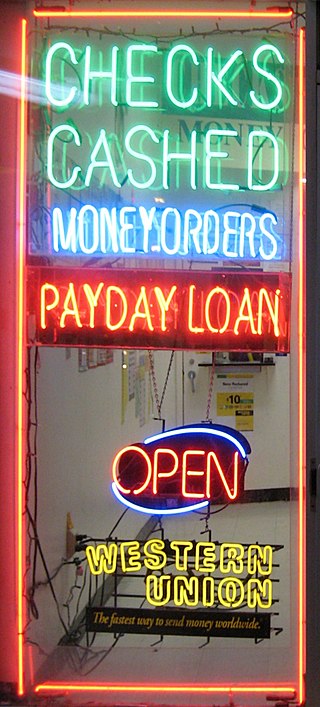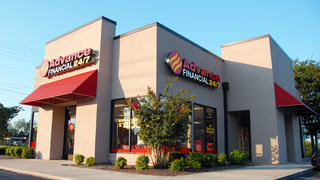
In finance, a loan is the transfer of money by one party to another with an agreement to pay it back. The recipient, or borrower, incurs a debt and is usually required to pay interest for the use of the money.

A payday loan is a short-term unsecured loan, often characterized by high interest rates. These loans are typically designed to cover immediate financial needs and are intended to be repaid on the borrower's next payday.
A loan shark is a person who offers loans at extremely high or illegal interest rates, has strict terms of collection, and generally operates outside the law, often using the threat of violence or other illegal, aggressive, and extortionate actions when seeking to enforce the satisfaction of the debt. As a consistent or repeated illegal business operation or "racket", loansharking is generally associated with organized crime and certain criminal organizations.
Predatory lending refers to unethical practices conducted by lending organizations during a loan origination process that are unfair, deceptive, or fraudulent. While there are no internationally agreed legal definitions for predatory lending, a 2006 audit report from the office of inspector general of the US Federal Deposit Insurance Corporation (FDIC) broadly defines predatory lending as "imposing unfair and abusive loan terms on borrowers", though "unfair" and "abusive" were not specifically defined. Though there are laws against some of the specific practices commonly identified as predatory, various federal agencies use the phrase as a catch-all term for many specific illegal activities in the loan industry. Predatory lending should not be confused with predatory mortgage servicing which is mortgage practices described by critics as unfair, deceptive, or fraudulent practices during the loan or mortgage servicing process, post loan origination.
Peer-to-peer lending, also abbreviated as P2P lending, is the practice of lending money to individuals or businesses through online services that match lenders with borrowers. Peer-to-peer lending companies often offer their services online, and attempt to operate with lower overhead and provide their services more cheaply than traditional financial institutions. As a result, lenders can earn higher returns compared to savings and investment products offered by banks, while borrowers can borrow money at lower interest rates, even after the P2P lending company has taken a fee for providing the match-making platform and credit checking the borrower. There is the risk of the borrower defaulting on the loans taken out from peer-lending websites.

A title loan is a type of secured loan where borrowers can use their vehicle title as collateral. Borrowers who get title loans must allow a lender to place a lien on their car title, and temporarily surrender the hard copy of their vehicle title, in exchange for a loan amount. When the loan is repaid, the lien is removed and the car title is returned to its owner. If the borrower defaults on their payments then the lender is liable to repossess the vehicle and sell it to repay the borrowers’ outstanding debt.

Moneytree, Inc. is a retail financial services provider headquartered in Tukwila, Washington, with branches in Washington, California, Colorado, Idaho, Nevada, and British Columbia. Moneytree offers payday loans, installment loans, prepaid debit cards, money orders, bill payment, Western Union transfers, auto equity and title loans. In 2013, Moneytree won "Best Place to Work in Colorado" in the small business category.
The Community Financial Services Association of America (CFSA) is a trade association in the United States representing the payday lending industry.

Scott Tucker is an American convicted racketeer, loan shark, fraudster, and money launderer who used his illegal funds to finance – and drive for – his own sports car endurance racing team.

A payday loan is a small, short-term unsecured loan, "regardless of whether repayment of loans is linked to a borrower's payday." The loans are also sometimes referred to as "cash advances," though that term can also refer to cash provided against a prearranged line of credit such as a credit card. Payday advance loans rely on the consumer having previous payroll and employment records. Legislation regarding payday loans varies widely between different countries and, within the United States, between different states.

Payday loans in the United Kingdom are typically small value and for short periods. Payday loans are often used as a term by members of the public generically to refer to all forms of High-cost Short-term credit (HCSTC) including instalment loans, e.g. 3-9 month products, rather than just loans provided until the next pay day.
Payday loans in Canada are permitted under section 347.1 of the Criminal Code, so long as the province of the borrower has enacted sufficient provincial legislation concerning the provisioning of payday loans. In the event that no such provincial legislation exists payday loans are limited by usury laws, with any effective (compound) rate of interest charged above 60% per annum considered criminal. However, so far this has not been enforced by Newfoundland and Labrador.
Payday loans in Australia are part of the small loans market, which was valued at around $400 million a year in the 12 months to June 2014.

William Allan Jones Jr. is an American businessman from Cleveland, Tennessee. He is the founder, chairman and CEO of Check Into Cash, Creditcorp, Jones Management Services and the Community Financial Services Association, and several other local lending agencies. He has been called the "father of the payday loan industry" for founding and building the first major payday loan chain.

Wonga.com, also known as Wonga, was a British payday loan firm that was founded in 2006. The company focused on offering short-term, high-cost loans to customers via online applications, and began processing its first loans in 2007. The firm operated across several countries, including the United Kingdom, Spain, Poland and South Africa; it also operated in Canada until 2016, and in Germany, Switzerland, Austria and the Netherlands through the German payments business, BillPay, between 2013 and 2017.
A guarantor loan is a type of unsecured loan that requires a guarantor to co-sign the credit agreement. A guarantor is a person who agrees to repay the borrower’s debt should the borrower default on agreed repayments. The guarantor is often a family member or trusted friend who has a better credit history than the person taking out the loan and the arrangement is, therefore, viewed as less risky by the lender. A guarantor loan can, consequently, enable someone to borrow either more money, or the same amount at a lower rate of interest, than they would otherwise be able to secure through a more traditional type of loan.

Check Into Cash is a financial services retailer with more than 1,100 stores in 30 states. The company was founded in 1993 by W. Allan Jones in Cleveland, Tennessee, where the headquarters are located today.

Satsuma Loans was a British an online loan provider and payday lender offering short-term loans. It was launched by doorstep lender Provident Financial in 2013 and was closed down in 2021.

Founded in 1996, Advance Financial is a fintech company based in Nashville, Tennessee. Advance Financial provides lending decisions on cash loans and other financial services. It employs over 1100 employees and in 2019 was named to the Inc.com 5000 list of the fastest-growing private companies in the country for the eighth year in a row.
goeasy Ltd. is a Canadian alternative financial services company based in Mississauga, Ontario. It operates with three business units – easyfinancial, which offers loans to non-prime borrowers; easyhome, which sells furniture and other durable goods on a lease-to-own basis; and LendCare, a provider of point-of-sale consumer financing.










